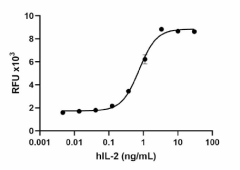- Other Names
- T-cell growth factor (TCGF), Eosinophil differentiation factor (EDF), Killer cell helper factor (KHF), Macrophage-activating factor for cytotoxicity I (MAF-C I), Thymocyte differentiation factor (TDF)
- Ave. Rating
- Submit a Review
- Product Citations
- publications

-

GMP Recombinant human IL-2 induces the proliferation of mouse HT-2 cells in a dose-dependent manner. The ED50 for this effect is 0.3 – 1.5 ng/mL.
| Cat # | Size | Price | Quantity Check Availability | Save | ||
|---|---|---|---|---|---|---|
| 791925 | 100 µg | 520 CHF | ||||
IL-2 was discovered through its function as a T cell growth factor (TCGF). It plays a pivotal role in immune responses against pathogenic infection. Recognition and binding of foreign antigens by the TCRs stimulate both the secretion of IL-2 and the expression of IL-2Rs on the T cell surface. Subsequently, the IL-2/IL-2R interaction activates the intracellular Ras/Raf/MAPK, JAK/STAT, and PI3K/AKT signaling pathways, and ultimately stimulates the growth, differentiation, and survival of the Ag-selected cytotoxic T cells. Human IL-2 acts on murine and human T cells, and its receptors are shared by other cytokines. IL-2Rα is an IL-2–specific receptor, IL-2Rβ is shared with IL-15 and the γ chain that is a common receptor shared by many cytokines including IL-2, IL-4, IL-7, IL-9, IL-15, and IL-21.
Product DetailsProduct Details
- Source
- Human IL-2 amino acid (Ala21-Thr153) (Accession: # P60568), was expressed in E.coli.
- Molecular Mass
- The 133 amino acid recombinant protein has a predicted molecular mass of approximately 15.41 kD. The DTT-reduced and non-reduced protein migrates at approximately 15.4 kD by SDS-PAGE. The predicted N-terminal amino acid is Ala.
- Purity
- > 95%, as determined by Coomassie stained SDS-PAGE.
- Formulation
- Protein was lyophilized from 0.2 μm filtered solution contain 0.1% TFA, 10% Acetonitrile.
- Endotoxin Level
- Less than 0.1 EU per µg of protein as determined by the LAL method.
- Concentration
- 100 μg size is lyophilized
- Storage & Handling
- Unopened vial can be stored between 2°C and 8°C for up to 2 weeks, at -20°C or colder until the expiration date. Reconstitute lyophilized protein in sterile 100 mM Acetic acid. Before reconstitution, make sure sterile 100 mM Acetic acid and product are at room temperature. Quickly spin the vial or gently tap down on the vial to make sure the lyophilized product is at the bottom of the vial before opening. Use aseptic techniques to add the required volume of reconstitution buffer (sterile 100 mM Acetic acid) to the vial, to obtain the recommended stock concentration 250 μg/mL. Close the vial and leave at ambient temperature for 15-20 minutes. Then gently invert the vial several times or until all of the lyophilized product dissolves. Leave the vial at room temperature for another 15 minutes. If small particulates are still observed after 15 minutes, incubate at room temperature for an additional 30 minutes, and leave the vial at 2°C - 8°C overnight. Next day, invert the vial several times or gently pipette the solution up and down before use. If needed, transfer the reconstituted stock solution to a sterile container for additional dilution to no less than 100 μg/mL. Small working aliquots in polypropylene tubes can be made after reconstitution and store the vials at -20°C or lower. Avoid freeze/ thaw cycles. Carrier protein such as 0.2 - 1% endotoxin-free BSA or HSA can be added when preparing the stock solution. Aliquots can be stored between 2°C and 8°C for up to two weeks or stored at -20°C or colder for up to 3 months.
- Activity
- GMP recombinant human IL-2 induces the proliferation of mouse HT-2 cells in a dose-dependent manner. The ED50 for this effect is 0.3 – 1.5 ng/mL.
- Application
-
Bioassay
- Application Notes
-
Our liophilized proteins are validated in-house to maintain activity after shipping at ambient temperature and are backed by our 100% satisfaction guarantee. If you have any concerns, contact us at tech@biolegend.com.
- Disclaimer
-
GMP Recombinant Proteins. BioLegend GMP recombinant proteins are manufactured in a dedicated GMP facility and compliant with ISO 13485:2016. For research or ex vivo cell processing use. Not for use in diagnostic or therapeutic procedures. Our processes include:
- Batch-to-batch consistency
- Material traceability
- Documented procedures
- Documented employee training
- Equipment maintenance and monitoring records
- Lot-specific certificates of analysis
- Quality audits per ISO 13485:2016
- QA review of released products
BioLegend GMP recombinant proteins are manufactured and tested in accordance with USP Chapter 1043, Ancillary Materials for Cell, Gene and Tissue-Engineered Products and Ph. Eur. Chapter 5.2.12.
Antigen Details
- Structure
- Monomer
- Distribution
-
T cells (CD4+ and CD8+), gamma δ T cells, B cells, dendritic cells, and eosinophils. Mainly activated T cells.
- Function
- Differentiation of Th1 and Th2 cells, inhibition of Th17 and Tfh cell differentiation, regulation of Treg differentiation, T cell proliferation, B cell proliferation, promotes CD8 and NK cell cytolytic activity.
- Interaction
- CD4 T cells, T reg cells, CD8 effector cells, NK cells, B cells
- Ligand/Receptor
- Trimeric receptor: IL-2Rα (CD25), IL-2Rβ (CD122), and γc (CD132) and dimeric receptor:IL-2Rβ (CD122) and γc (CD132)
- Bioactivity
- Recombinant human IL-2 induces the proliferation of mouse HT-2 cells in a dose-dependent manner.
- Antigen References
-
- Siegel JP, et al. 1987. Science. 238:75.
- Cote-Sierra J, et al. 2004. Proc Natl Acad Sci U S A. 101:3880.
- Laurence A, et al. 2007. Immunity. 26:371.
- Sakaguchi S, et al. 2008. Cell. 133:775.
- Liao W, et al. 2011. Nat Immunol. 12:551.
- Ballesteros-Tato A, et al. 2012. Immunity. 36:847.
- Liao W, et al. 2013. Immunity. 38:13.
- Read KA, et al. 2016. Exp Hematol. 44:799.
- Gene ID
- 3558 View all products for this Gene ID
- UniProt
- View information about IL-2 on UniProt.org
 Login / Register
Login / Register 













Follow Us